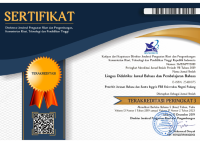The Voice of Human Ecology in the Novel The Bear (2020) by Andrew Krivak
 ),
), (1) Universitas Indonesia
 Corresponding Author
Corresponding Author
Copyright (c) 2021 Lingua Didaktika: Jurnal Bahasa dan Pembelajaran Bahasa
DOI : https://doi.org/10.24036/ld.v15i2.115620
Full Text:
 Language : en
Language : en
Abstract
Keywords
References
Buell, Lawrence dkk. (2011). Literature and Environment. Stanford: Stanford University.
Huebert, David. (2017). Eating and Mourning the Corpse of the World: Ecological Cannibalism and Elegiac Protomourning in Cormac McCarthy's The Road. University Park: Penn State University Press.
Kim, GoWoon dkk. (2017). Social-ecological memory in an autobiographical novel: ecoliteracy, place attachment, and identity related to the Korean traditional village landscape. Halifax: Resilience Alliance Inc.
Krivak, Andrew. (2020). The Bear. New York: Bellevue Literary Press.
Lestari, Nanny Sri. (2018). Environmental Issue in Literary Work. Depok: Universitas Indonesia.
Mishra, Sandip Kumar. (2016). Ecocriticism: A Study of Environmental Issues in Literature. Ramnagar: BRICS Journal of Educational Research.
Orda, G. dkk. (2019). The nature and human ecology in modern kazakh literature. Toluca: Redalyc.
Reis, Ashley E. (2015). From Self to World: The Holistic Ecology of John Steinbeck's Early Fiction. University Park: Penn State University Press.
Santoso, Tri dkk. (2020). The Relationship Between Humans And Natural Environment In Luka Perempuan Asap Novel By Nafi'ah Al-Ma'rab: Literature Ecocritics Review. Delhi: International Journal of Scientific & Technology Research.
Stewart, Philip J. (2017). Meaning in Human Ecology. Canberra: The Australian National University Press.
Tsekos, Christos A. (2012). Ecology, Literature and Environmental Education. Agrinio: University of Western Greece.
 Article Metrics
Article Metrics
 Abstract Views : 483 times
Abstract Views : 483 times
 PDF Downloaded : 337 times
PDF Downloaded : 337 times
Refbacks
- There are currently no refbacks.
Copyright (c) 2021 Lingua Didaktika: Jurnal Bahasa dan Pembelajaran Bahasa

This work is licensed under a Creative Commons Attribution-NonCommercial 4.0 International License.









